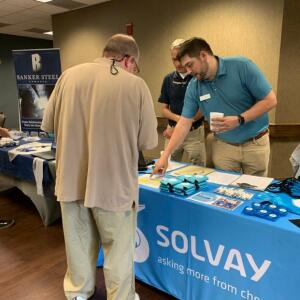Amid rising student debt and lack of needed skills, York County students learn on the job
BY AMANDA HARRIS | THE HERALD
aharris@heraldonline.com
Through Apprenticeship Carolina, a division of the S.C. Technical College System, employers sponsor apprenticeships, providing on-the-job training to help students forge a career path, according to the program’s website. Apprenticeships are registered with the U.S. Department of Labor and meet national training standards. Employers receive a $1,000 tax credit for each registered apprentice employed for at least seven months.
Apprentices are paid for their work and their pay increases as they meet benchmarks outlined by the employer, according to Apprenticeship Carolina.
BNA has offered internships for local students for many years, but recently formalized their program through Apprenticeship Carolina, said Susan Brackett, work-based learning coordinator for the Fort Mill school district. Brackett vets students who are interested in a field to find the few who are qualified for an apprenticeship, then helps match them with a company.
At BNA, Whyte is one of the last people to see tax returns after accountants have finished and before they go to clients. Whyte said having that level of responsibility has taught her to be independent and learn to double-check her work.
Whyte, who joined BNA in November 2015, said she also answers phones and works with happy and upset clients.
“I used to be shy talking to people, but now I’m more comfortable talking with random strangers,” she said. “It’s really good to put yourself out there. You meet a lot of people and learn how to interact well with them.”
Whyte works 20 hours a week and attends high school full time.
“I’ve learned to balance it well,” she said. “I’m more prepared to go into the world. It shows you that you can’t choose everything. When you grow up, you have to work, and it will be crazy and stressful.”
Preparing students
South Carolina is pushing for more students to be college and career ready, with an emphasis on gaining skills, said Ryan Brown, chief communications officer for the S.C. Department of Education. He said South Carolina has been successful in bringing companies and jobs here, but “our students don’t have the skills and knowledge to fill them.”
That’s where the apprenticeship program comes in, Brown said. He said the program has grown exponentially in the last five years and has expanded from technical college into high schools.
“We want companies to come to S.C.; we don’t want them to go out of state to fill jobs,” Brown said. “This program helps companies out as well. (The students) are learning new skills, getting career certified and getting paid.”
Those benefits and the opportunity to work with his hands are what drove Nation Ford graduate Caleb Beach, now 21, to take on an apprenticeship through Schaeffler Group North America in Fort Mill, a leading engineering partner and supplier to major automobile manufacturers.
“I am not the type of person that likes to be behind a desk,” he said.
Beach is a Tool and Die maker apprentice at Schaeffler. He said through making fixtures, dies, molds and other tools used in manufacturing, he has learned the importance of precision.
“Something could be a 1,000th of an inch off and that will ruin that whole part, so you have to take your time and make sure it’s precise,” he said.
Schaeffler partners with York Technical College and pays their apprentices to earn an associate degree, according to the Group. Apprentices learn the basics and later split their time between school and work, said Beach, who has since graduated.
“I would go from learning in school and that same day taking what I learned and incorporating it into actual work,” he said. “It helped me learn what I was doing.”
Schaeffler’s apprentices also work with a mentor on the job after they finish school.
Apprenticeships are common for Schaeffler, a company with European roots, said Robert Nefermann, segment leader. Nefermann started with the company as an apprentice in Germany and worked his way up. He transferred 12 years ago to the U.S.
Nefermann said apprenticeships provide students with a chance to grow a career, but also gives the company a way to recruit young talent.
“Manufacturing, in general, is maybe not for everyone attractive,” he said. “We need to make manufacturing a cool place to be. Things should be moving forward in the U.S. to bring the workforce to a level where we can be profitable and successful.”
Ackerman said BNA, a small firm founded in Rock Hill, benefits from adding quality students to their team.
“It’s hard for us to compete for the talent that wants to go to a larger firm,” he said. “Apprenticeships are a better way to recruit for us. When we get someone from high school, our goal is to hire them full time.”
Apprenticeship programs also have helped students understand what careers entail. When Whyte heard about accounting, she had a different idea of what she would be doing.
“I thought it would be a bunch of old people sitting on desks,” she said. But, Whyte said “it’s interesting.”
Apprenticeship Carolina reports that across the nation, registered apprenticeship programs have been established for more than 950 occupations. Those include the traditional manufacturing or electrical trades, but also health care and other fields. BNA is one of the few accounting firms to offer training to high school students, Brackett said.
“It’s good for students in high school to get a taste of the real world and different careers,” Ackerman said. “It’s better to find out if you don’t like something in high school than in your third year of college when you’re already majoring in something. You don’t want to be in a job for 40 years where you’re unhappy.”
Career vs. College
Brown said many options exist to students who choose a career path with technical education and certification.
“We want (students) to come out of a two- or four-year degree program with a job, but we’re seeing more and better jobs coming out of the two-year path than those coming out of a four-year degree,” he said.
While BNA requires extended education, that isn’t the case for every career, Ackerman said. He said a mindset shift needs to occur as student loan debt becomes a growing concern.
“We have to get it out of our heads that you have to have a college degree,” Ackerman said. “You don’t have to have a college degree dependent upon what you want to do. There is a lack of what employers want and what people are doing. It’s mismatched right now, and I think that’s going to change.”
The opportunity to learn and be paid meant Beach didn’t graduate with a loan debt to pay.
“I came out with a skill and money in my pocket,” he said. “Work-based learning is one of the best opportunities I was ever offered.”
View more news




